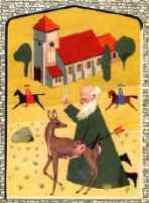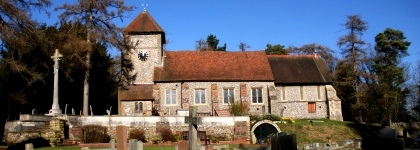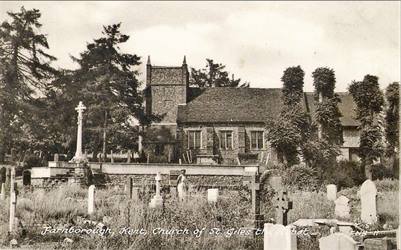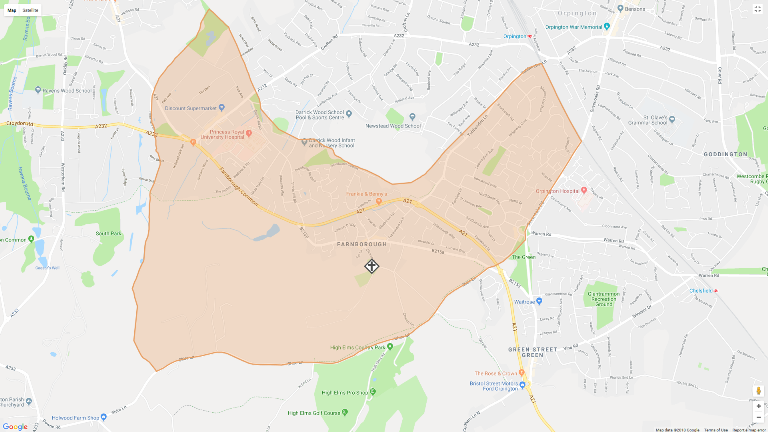


FARNBOROUGH PARISH HISTORY AND ARCHIVES
There has been a church in Farnborough for many centuries. It is believed that one has stood on the high piece of land to the south of the village for about 1500 years. The view from this point takes in the farm land and natural woodland right down the valley and to the top of the next hill.
However Farnborough only became a full parish in 1876, with George William Hingston as its first Rector. Before that Farnborough was part of the larger and more populous parish of Chelsfield, sometimes having its own Rector. but more usually a Curate.
For full details see Chelsfield with Farnborough.
This explains why the church at Farnborough is comparatively small, even though the population of Farnborough has grown significantly since the second world war. Today the Farnborough and Chelsfield wards both have populations of around 14,500 (2021 census)
This is an early Ordnance Survey map dated to 1880. It shows many changes from a modern map. The church is there of course, but the main churchyard is not, as the land it now occupies was purchased from the Lubbock family at around the time the map would have been surveyed.
 Village map 1880, showing original National School (copyright, Ordnance Survey) |
Within the village the National School is shown, descended from a Dane School, also there is the original George and Dragon Inn. To the north of the High Street there are a great many differences, Farnborough Hall stands in isolation, completely surrounded by its once extensive estate lands. There is the collection of old shops and houses along the original part of the through road, but today's main parade of shops has yet to be built, and of course the later housing is not shown.
From 1876 many changes were to take place.
The Parish Vestry consisting of Rector, Churchwardens and Overseers had carried out all civil duties in the parish, such as raising local taxes, looking after the poor and repairing the roads for many centuries. An Act of Parliament of 1895 brought into being an elected Civil Parish Council, whose area of administration was the same as the Ecclesiastical Parish. In 1934 the civil parish of Farnborough was combined with other Civil Parishes to form Orpington Urban District. In 1963 this in turn became part of the new London Borough of Bromley.
The Parish Vestry continued for the Ecclesiastical Parish after 1895, but was in turn replaced, by Act of Parliament, by the Parochial Church Council from 1921.
This is a modern map of Farnborough Parish, which maintains the boundary established in 1938 with the removal of Green Street Green..
After the Second World War, the Parish of Farnborough began to grow in population. New housing developments were established and by the 1950s it was recognized that an additional place of worship was needed to serve the increasing number of parishioners resident in the part of the Parish separated since 1927 by Farnborough bypass.
On Sunday
22nd June, 1958 ‘The New Hall Church’, situated in Leamington
Avenue, Orpington was opened and dedicated. Ten years later the Hall was re-named St.
Nicholas’ Church Hall. It is now St. Nicholas Church - see St.
Nicholas history
Rectors of Farnborough Parish
The first Rector of Farnborough Parish, George William Durrock Hignston (1876), was succeeded in 1885 by Frederick Jessop Kelly, and in 1898 by Groves Lombard.
There were eight Rectors in the twentieth century, who are shown in these photographs, which are on display by the font in the church..
| Rector 1904 - 1927 | Revd. Ebenezer Joseph Welch | ||
| Rector 1927 - 1940 | Revd. Robert Gladstone Griffiths | ||
| Rector 1940 - 1950 | Revd. Ernest Peter Field | ||
| Rector 1950 - 1964 | Revd. Albert Aidan Chapman | ||
| Rector 1964 - 1973 | Revd. David Basil Webb | ||
| Rector 1974 - 1987 | Revd. John Perry Druce | ||
| Rector 1988 - 1995 | Revd. Graham Shaw | ||
| Rector 1995 - 2000 | Revd. Mark Richard Turner |
The present incumbent, Revd. Matthew Hughes, came to St. Giles in 2001.
PARISH HISTORY
Parish Archives
The parish has many documents, dating back to the seventeenth
century, that may be helpful to
people doing research. Some of these need to be accessed and
possibly updated on a regular basis, and these are still stored in the
church. But the majority are now deposited in the Local Studies archive
in the Central Library in Bromley.
Important Note:
Bromley Central Library is due to relocate c. June 2026 to the old TopShop site at 145 High Street. This site will include a designated Search Room for Bromley Historic Collections whilst a new purpose-built Archive and Museum store is being built within the Borough.
Ahead of this move, the Archive Collection, including Parish Records, is being temporarily relocated to an offsite storage facility from 11th August 2025. Access to the records will be suspended whilst the move takes place and will continue to be available by appointment from mid-October 2025
Open resources in the Search Room at Central Library will still be available including some transcript and microfilm copies of parish registers and our enquiry service will remain open.
For a full list of what Parish documents are archived in Bromley
Central store please look in their website.
We also from time to time request a more detailed list of what is in
store.
This is available for download here:
P144_St Giles_Farnborough.pdf
For more detailed information about burial registers please refer to the
Burial and Cremation Registers page
on this website.


